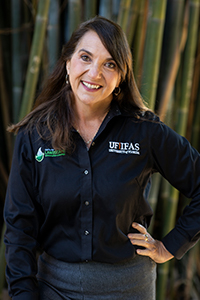Wendy's Wanderings
February 11, 2021
Amending a Sandy Situation
Gardening and landscaping in Florida can be a challenge. The growing climate is agreeable, but many parts of Florida have soils that are tough to grow in. They can be clay, rock, or deep sands depending where you live. For most of the state we have very sandy soils. Gardeners have asked me, "Why is the soil so sandy?"
The answer to that lies in ancient history. Florida has been under shallow sea water several times during geological eras. The clays and organic matter were washed away, and the marine sand and rock remained.
What are we to do with these deep sandy soils that most of peninsular Florida contends with? The best thing you can do is to put the right plant in the right place. Many Florida native plants are well adapted to our sandy soils, and there are plenty of Florida-Friendly plants that are too. However, almost all of our plants would greatly benefit from added organic matter in the form of mulch or compost.
Good gardeners grow plants, great gardeners grow soil. The great gardeners that I know take their composting very seriously. My parents were so serious about composting that they had "his and hers" piles because they could not agree on the best method of composting. Dad's was heavy on shredded paper, food waste, and yard clippings; Mom's had everything in it but the kitchen sink. Both piles generated lots of organic matter to amend the rocky soils of southernmost Florida. When I went to visit my sister's first home, she didn't directly show me her new house, she first proudly took me to her steaming compost pile. My family, like many gardeners, realized the environmental benefits of compost such as keeping food scraps out of the waste stream and reducing methane gas production.
In the garden and landscape, adding finished compost to your soil improves the soil's water-holding ability, its nutrient-holding capacity, and increases the beneficial microbial activity of the soil. Increasing your soil's organic matter with compost by 5% can quadruple the soil's water-holding capacity. That would be a huge help to our plants during the dry season.
Facts like these are in "Composting for a New Generation," this year's first selection for the Master Gardener Volunteer book club. This book is informative and inspirational; it will give you the know-how and skills to get you composting this season. Will this book solve marital disputes on composting? Absolutely!
-- Wendy Wilber

